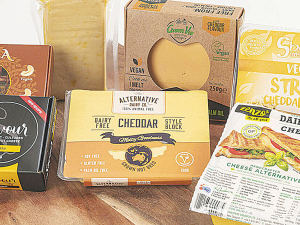Santa's present for the primary sector - an FTA with India
Primary sector leaders have welcomed the announcement of a Free Trade Agreement between India and New Zealand.
 The dairy sector is frustrated by incorrect labelling and advertising of products like vegan cheddar. Photo Credit: Vegan Society of Aotearoa.
The dairy sector is frustrated by incorrect labelling and advertising of products like vegan cheddar. Photo Credit: Vegan Society of Aotearoa.
Dairy processors are backing a call for factual and clear labelling on consumer products.
Dairy Companies Association of New Zealand (DCANZ) executive director Kimberly Crewther says they share concerns that current labelling practices for plant products risk significant consumer confusion, and agree that clear, standardised, enforceable and enforced labelling regulations are essential to support informed purchasing decisions.
Her comments come on the back of a petition launched by the New Zealand Vegetarian Society and the Vegan Society of Aotearoa to advocate for clear and standardised labelling for vegetarian and vegan products in New Zealand.
The petition calls on the Government to implement legislation that ensures consumers can make informed choices about the products they purchase. According to the two organisations, as the use of ambigious terms such as "plant-based" or "less dairy" grows, it is becoming increasingly difficult for consumers to understand what is in their food without thoroughly reading the ingredient list.
Crewther agrees that it's time for plant products to define and label products in a way that describes their characteristics and avoids confusion with milk and milk products.
"This clearer labelling for plant-products should start with greater adherence in New Zealand to the internationally agreed standard for use of dairy terms - under Codex Alimentarius," she told Dairy News.
"This internationally agreed standard defines milk as coming from milking animals. Butter, cheese, yoghurt, cream, ice cream, and whey all have definitions that specify being made from milk. There are also standards for a range of cheeses including cheddar and mozzarella that link back to milk.
"The dairy industry is continually frustrated by incorrect labelling and advertising of products in ways that are totally inconsistent with the existing labelling standard that was developed and agreed multinationally, including by New Zealand. Examples include vegan cheddar or more recently marine whey, which by definition are totally contradictory."
Crewther points out that the purpose of the agreed international standard is to protect consumers from being confused or misled and ensure fair practices in food trade,
DCANZ is concerned that expanding use of dairy technology in the labelling of new non-dairy foods is making it more difficult for consumers to make informed dietary choices.
"We would like to see the New Zealand government to do more to bring New Zealand food labelling practice in line with the international standards," says Crewther.
"Milk is a natural superfood that is rich in highly digestible protein and a range of nutrients that are essential for a healthy diet. A nutritional comparison of milk versus plant-based alternatives on New Zealand supermarket shelves, by the Riddet Institute, confirmed they simply do not compare to milk nutritionally."
The study found that milk substitutes have high cost and low nutritional benefits.
It would be more appropriate for them to be labelled distinctly using unique plant-based terms as in the requirement in Europe, according to Crewther.
"In seeking clearer food labelling the dairy industry acknowledge the important role that plant-based foods play alongside animal sourced foods in healthy diets for New Zealanders.
"Studies by the Sustainable Nutrition Initiative have confirmed that the most affordable nutritionally adequate diet for New Zealanders is one where the nutritional contributions of plants are optimised by high quality milk and meat products."
Global trade has been thrown into another bout of uncertainty following the overnight ruling by US Supreme Court, striking down President Donald Trump's decision to impose additional tariffs on trading partners.
Controls on the movement of fruit and vegetables in the Auckland suburb of Mt Roskill have been lifted.
Fonterra farmer shareholders and unit holders are in line for another payment in April.
Farmers are being encouraged to take a closer look at the refrigerants running inside their on-farm systems, as international and domestic pressure continues to build on high global warming potential (GWP) 400-series refrigerants.
As expected, Fonterra has lifted its 2025-26 forecast farmgate milk price mid-point to $9.50/kgMS.
Bovonic says a return on investment study has found its automated mastitis detection technology, QuadSense, is delivering financial, labour, and animal-health benefits on New Zealand dairy farms worth an estimated $29,547 per season.
OPINION: Staying with politics, with less than nine months to go before the general elections, there’s confusion in the Labour…
OPINION: Winston Peters' tirade against the free trade deal stitched with India may not be all political posturing by the…